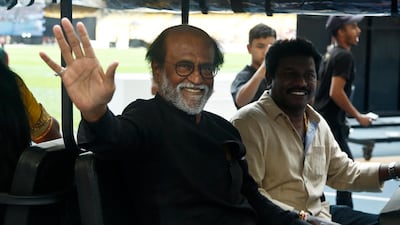In India, popular Tamil film star Rajinikanth announces his political debut "in the name of democracy," which he says "has been corrupted and needs to be cleansed." In the US, fevered speculation surrounds the political prospects of much-loved television talk show host Oprah Winfrey.
Nearly 15,000 kilometres apart, the developments in Chennai and Los Angeles might share a fateful link. Tamil Nadu today is what the US might well be tomorrow in terms of its politics.
For, superstar Rajinikanth's recently stated political aspirations and probable success underline the 50-year takeover by cinema of a particular brand of "rationalist" politics practised by non-Brahmin Tamils. And if the US were to have a President Winfrey in 2020, just four years after the election of reality TV star Donald Trump, it would establish the hold of celebrity performers on the White House.
Is that so bad? The US has had an actor-turned-president before and Ronald Reagan is considered one of the most influential modern presidents. Yes, but it is Mr Trump who technically breached the country's blood-brain barrier between entertainment and politics. Mr Trump made the leap straight from performance into frontline politics. Reagan put in time as a political apprentice, working with the actors' labour union and serving two terms as governor of California, America's most populous state. He ran – and lost – two Republican party presidential nomination elections before finally getting on to the ticket and defeating incumbent Jimmy Carter.
In Tamil Nadu too, the actor who swapped box office success half-a-century ago for the very highest reaches of state politics also spent time learning the ropes. M G Ramachandran went from 30 years as Tamil Nadu’s biggest box office attraction to a relatively lowly position as a member of the legislative assembly and then to triumphant election (and re-election) as chief executive of the whole state. MGR, as he was popularly known, ultimately created a populist movement that relied on a state-wide personal fan club and a freebie culture to win elections rather than on governance or solid policy positions. And yet, MGR did in some way demonstrably prepare for the job of political leader, no matter the results of his actual stint in office.
That’s the difference between MGR’s political journey and Rajinikanth’s announcement that he is soon to embark on one. And therein lies the chasm between a potential President Winfrey and the late President Reagan.
_______________________
Read more from Opinion
Adnan Amin: The falling cost of renewables brings new economic opportunity to the Gulf
Razan Al Mubarak: The Arabian Gulf is a living system that we need to preserve
Afshin Molavi: One of the defining features of our century will be the rise of the Asian city
_______________________
Both Rajinikanth and Oprah lack the preparation required for key political roles though there is nothing to stop them acquiring it in the future.
In fact, Oprah is being urged by some to follow Reagan’s lead and run for governor of California. That is a welcome recognition celebrity should not be enough to make a credible bid for the White House. But consider the vastly different response in Tamil Nadu to Rajinikanth’s bid for political power.
Few are calling for Rajinikanth to undertake the hard slog of learning the art of politics and the science and substance of policy. There lies the basic difference between US politics and that in an Indian state where half a century of electorally decisive star-power has led to a democratic deficit.
Rajinikanth and Oprah are effective speakers and consummate performers. Both have, in different ways, dabbled in politics. But their preparation and motivation – is it for ego or meant to serve? – should be at least as important as name-recognition when it comes to high political office.
If not, we may be closer than we realise to the fictional land of the Bongas, so minutely described by the Italian novelist, philosopher and semiotician Umberto Eco. In 1987, Eco published a charming essay titled How to be a TV host. It was part of an eccentric collection called How to travel with a salmon.
Eco described the Bonga nation, “a society that flourishes in an area between Terra Incognita and Isles of the Blest”. The Bongas were, Eco noted, a people with an unusual insistence on the explicit, the declarative. They prefaced speech with the words, “pay attention, I am now speaking and I will use some words”.
The Bongas, said Eco, "write 'house' on every house and 'door' beside the door". Their theatre also rejoiced in "obsessive clarification". Eco puzzled over this and offered the following diagnosis. The Bongas were "performance-worshippers. They had to transform everything, even the implicit, into performance". This created an odd sort of reality. Eco wrote "the Bongas want television to show them real life, as it is lived, without pretence".
Would the abandonment of politics to a culture of celebrity and wealth not transform us into a later-day Bonga people? If high-ranking screen stars without organic lived policy-making experience are the only people we consider for high office, the democratic deficit will deepen.


